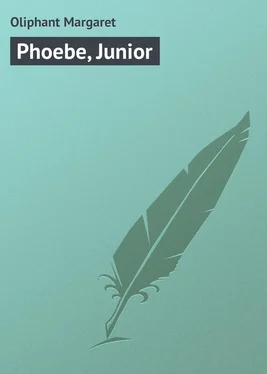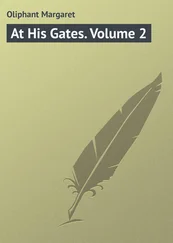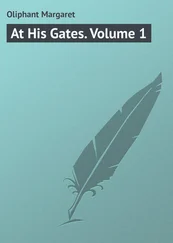Margaret Oliphant - Phoebe, Junior
Здесь есть возможность читать онлайн «Margaret Oliphant - Phoebe, Junior» — ознакомительный отрывок электронной книги совершенно бесплатно, а после прочтения отрывка купить полную версию. В некоторых случаях можно слушать аудио, скачать через торрент в формате fb2 и присутствует краткое содержание. Жанр: foreign_prose, на английском языке. Описание произведения, (предисловие) а так же отзывы посетителей доступны на портале библиотеки ЛибКат.
- Название:Phoebe, Junior
- Автор:
- Жанр:
- Год:неизвестен
- ISBN:нет данных
- Рейтинг книги:3 / 5. Голосов: 1
-
Избранное:Добавить в избранное
- Отзывы:
-
Ваша оценка:
- 60
- 1
- 2
- 3
- 4
- 5
Phoebe, Junior: краткое содержание, описание и аннотация
Предлагаем к чтению аннотацию, описание, краткое содержание или предисловие (зависит от того, что написал сам автор книги «Phoebe, Junior»). Если вы не нашли необходимую информацию о книге — напишите в комментариях, мы постараемся отыскать её.
Phoebe, Junior — читать онлайн ознакомительный отрывок
Ниже представлен текст книги, разбитый по страницам. Система сохранения места последней прочитанной страницы, позволяет с удобством читать онлайн бесплатно книгу «Phoebe, Junior», без необходимости каждый раз заново искать на чём Вы остановились. Поставьте закладку, и сможете в любой момент перейти на страницу, на которой закончили чтение.
Интервал:
Закладка:
CHAPTER V
SELF-DEVOTION
“Mr. Copperhead's manner is not pleasant sometimes, that is quite true. We must make allowances, my dear. Great wealth, you know, has its temptations. You can't expect a man with so much money and so many people under him to have the same consideration for other people's feelings. He says to this man go and he goeth, and to that man come and he cometh.”
“That is all very well,” said Phœbe; “but he has no right, that I can think of, to be rude to mamma and me.”
“He was not exactly rude, my dear,” said Mrs. Beecham. “We must not say he was rude. Clarence ought to have divided his attentions more equally, we must admit, and his father was annoyed – for the moment. I have no doubt he has forgotten all about it long ago, and will be as pleasant as ever next time we meet.”
“I am quite sure of it,” said the pastor, “and at the worst it was but his manner – only his manner. In short, at the committee meeting yesterday nothing could have been nicer. He went even out of his way to send, as it were, a kind message to Phœbe. 'I needn't ask if Miss Phœbe enjoyed herself,' he said. Depend upon it, my dear, if there was a temporary annoyance it is both forgotten and forgiven, so far as Mr. Copperhead is concerned.”
“Forgiven!” Phœbe said to herself; but she thought it wiser to say nothing audible on the subject. Her father and mother, it was evident, were both disposed to extend any amount of toleration to the leading member. It was he who was the best judge as to what he had a right to be annoyed about. The family party were in Mr. Beecham's study, where the large bust of Mr. Copperhead stood on the mantelpiece, the chief decoration. How could any one be so wicked as to rebel against the influence of so great a personage? Phœbe had her own ideas, but she was wise and kept them to herself.
“And now,” said Mrs. Beecham, solemnly, “what is to be done, my dear, about this letter from my good papa?”
Phœbe was standing in front of a book-case, apparently looking for a book. She said nothing; but it was easy to perceive by the erectness of her shoulders, and the slight movement that ran through her, that her attention was fully engaged.
“Ah, yes indeed, what about it?” the pastor said. He put down the pen, which he had been holding in his hand by way of symbol that, amiable as he was, his attention to his woman-kind was an encroachment upon time which might be more usefully employed. But this was a serious question; he had no suggestion to offer, but he sat and twiddled his thumbs, and looked at his wife with interest suddenly aroused.
“There is a great deal to be thought of,” said Mrs. Beecham, “it is not a simple matter of family devotion. Of course if I had no other ties, nor other duties, everything would be easy. I should go at once to my poor suffering mamma.”
Mrs. Beecham was a clever woman, but she had not been able to get it out of her mind, owing to the imperfections of her education in youth, that it was a vulgar thing to say father and mother. “But in the present circumstances,” she continued, her husband having given his assent to this speech, “it is clear that I cannot do what I wish. I have you to think of, my dear, and the children, and the duties of my position. On the other hand, of course I could not wish, as poor mamma's only daughter, to have my sister-in-law called in. She is not the kind of person; she is underbred, uneducated. Of course she would be thinking of her own children, and what would be best for them. My parents have done all that ought to be expected from them for Tom. Considering all things, what they have to dispose of ought to go to Phœbe and Tozer. But Mrs. Tom would not see that.”
“It is very true, my dear; I don't suppose she would,” said Mr. Beecham, with an anxious air.
“Mrs. Tom,” said his wife, with some heat, “would think her own had the first claim. She maintained it to my very face, and after that what have we to expect? It's us that are Tozers,” she said; “as for you, Phœbe, you belong to another family. I put it in my own language of course, not in her vulgar way.”
“It is a very serious question altogether,” said the pastor, with some solemnity. “I don't see how you can get away, and I don't know what is to be done.”
“Whatever is to be done, I won't leave poor mamma in the hands of Mrs. Tom,” cries Mrs. Beecham, “not whatever it costs me. She's capable of anything, that woman is. To have her in the same town is bad enough, but in the same house nursing poor mamma! You and I would never see a penny of the money, Henery, nor our children – not a penny! besides the vexation of seeing one's own parents turned against one. I know very well how it would be.”
Mr. Beecham ceased twiddling his thumbs. The crisis was too serious for that indulgence. “The position is most difficult,” he said, “I see it all. It is easy to see it for that matter, but to decide what are we to do is not easy. To go back to Carlingford after so many changes, would it be good for you?”
“It would kill me,” said Mrs. Beecham, with energy, “you know it would kill me. Envy drove us out, and envy would bring me to the grave. I don't deceive myself, that is what I see before me, if I tear myself from all my duties and go. But on the other hand – ”
“Listen, mamma!” cried Phœbe, turning round suddenly; “if grandmamma is ill, and you are afraid to leave her alone, why not send me?”
Both her parents turned towards Phœbe, as she spoke; they listened to her with wonder and consternation, yet with admiring looks. Then they looked at each other consulting, alarmed. “You!” said Mrs. Beecham, and “You!” echoed the pastor, repeating in his great astonishment what his wife said.
“Yes, indeed, me – why not me? it would be only my duty,” said Phœbe, with great composure. “And there is nothing to keep me from going. I almost think I should like it – but anyhow, mamma, if you think it necessary, whether I like it or not – ”
“Phœbe, my darling, you are the best child in the world,” cried her mother, rising up, and going to her hastily. She gave her a kiss of maternal enthusiasm, and then she looked at her husband. “But should we take advantage of it?” she said.
“You see, my dear,” said Mr. Beecham, hesitating, “you might find many things different from what you are used to. Your grandpapa Tozer is an excellent man – a most excellent man – ”
“Yes, yes,” said his wife, with some impatience. She was as conscious as he was of the great elevation in the social scale that had occurred to both of them since they left Carlingford, and knew as well as he did that the old people had remained stationary, while the younger ones had made such advances; but still she did not like to hear her husband criticize her father. What there was to be said, she preferred to say herself. “Yes, yes,” she said, “Phœbe knows there is a difference; they are old-fashioned folks, and don't live quite as we live. Some things would strike you very strangely, my dear, some things you would not like; and then Phœbe may be, for anything I can tell, at a turning-point in her own life.”
“If you mean about the Copperheads, mamma, dismiss that from your mind,” said Phœbe. “There is no sort of hurry. We may be thrown together in after-life, and of course no one can tell what may happen, but in the mean time there is nothing of the sort in my mind – nor in any one else's. Do not think of that for a moment. I am at no turning-point. I am quite ready and quite willing to go wherever you please.”
Once more the parent pair looked at each other. They had been very careful not to bring their children into contact, since they were children, with the homelier circumstances of the life in which they themselves had both taken their origin. They had managed this really with great skill and discretion. Instead of visiting the Tozers at Carlingford, they had appointed meetings at the sea-side, by means of which the children were trained in affectionate acquaintance with their grandparents, without any knowledge of the shop. And Mr. Tozer, who was only a butterman at Carlingford, presented all the appearance of an old Dissenting minister out of it – old-fashioned, not very refined perhaps, as Mrs. Beecham allowed, but very kind, and the most doting of grandfathers. The wisp of white neckcloth round his neck, and his black coat, and a certain unction of manner all favoured the idea. Theoretically, the young people knew it was not so, but the impression on their imagination was to this effect. Mrs. Tozer was only “grandmamma.” She was kind too, and if rather gorgeous in the way of ribbons, and dressing generally in a manner which Phœbe's taste condemned, yet she came quite within the range of that affectionate contempt with which youth tolerates the disadvantages of its seniors. But the butterman's shop! and the entire cutting off from everything superior to the grocers and poulterers of Carlingford – how would Phœbe support it? This was what Mr. and Mrs. Beecham asked each other with their eyes – and there was a pause. For the question was a tremendous one, and neither knew in what way to reply.
Читать дальшеИнтервал:
Закладка:
Похожие книги на «Phoebe, Junior»
Представляем Вашему вниманию похожие книги на «Phoebe, Junior» списком для выбора. Мы отобрали схожую по названию и смыслу литературу в надежде предоставить читателям больше вариантов отыскать новые, интересные, ещё непрочитанные произведения.
Обсуждение, отзывы о книге «Phoebe, Junior» и просто собственные мнения читателей. Оставьте ваши комментарии, напишите, что Вы думаете о произведении, его смысле или главных героях. Укажите что конкретно понравилось, а что нет, и почему Вы так считаете.












